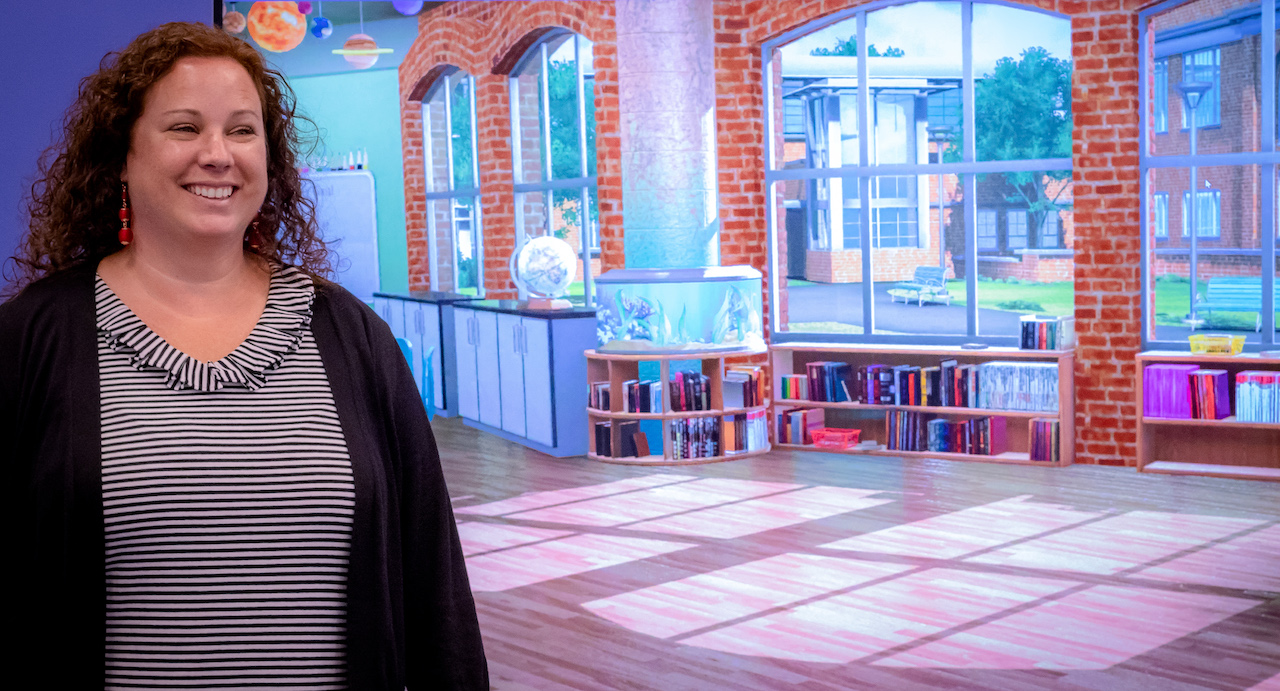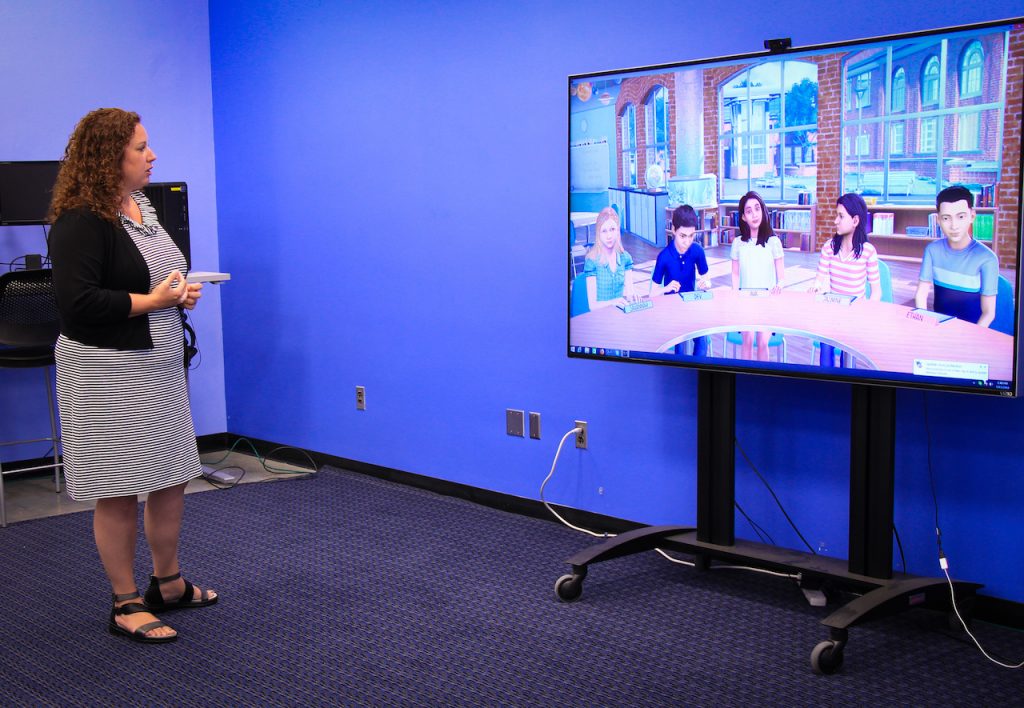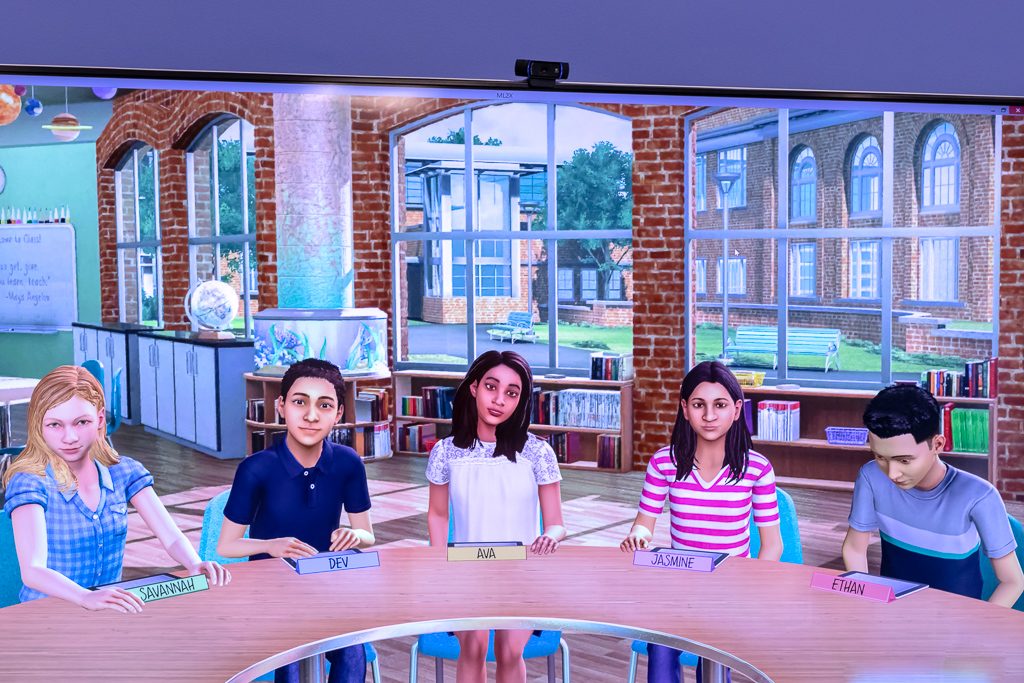
Pause and Learn: Angelosante uses virtual students to prepare educators for reality
Courtney Angelosante prepares Education majors with virtual classrooms and a wealth of expertise
Stepping into a classroom to teach for the first time can be exciting and overwhelming. Education majors at the University of Maine have the unique opportunity to practice teaching in a lab space that provides the ability to pause and receive instant feedback from supportive classmates and peers.
Students also benefit from the expertise of doctoral candidate Courtney Angelosante, a board-certified behavior analyst (BCBA), expert in Positive Behavior Interventions and Supports (PBIS), and lecturer in special education with the College of Education and Human Development, who uses UMaine’s TeachLivE lab to give students an ultimate classroom experience – with virtual student avatars.
Angelosante sees the benefit of preparing teachers with simulation technology before they enter the classroom. Having students encounter challenges in a safe environment helps maintain a sense of self-efficacy as they begin the first years of teaching. They can make mistakes and experiment in role-playing to build their knowledge base by putting what they’ve learned from lecture and study into practice.
“It’s not just learning about it – it’s doing it,” said Angelosante. “I’m proud to say we get applied experience under the belts of teachers before they get in the field with this program.”
Virtual students simulate the reality of a classroom
Angelosante is pursuing a doctorate in Education and has worked for many years in public schools as a classroom teacher, behavior interventionist special educator, BCBA and consultant. She knows first-hand how overwhelming the live classroom setting can be for new teachers. Using TeachLivE, Angelosante prepares her students to become comfortable and ultimately successful educators.
Students are given classroom instruction in how to respond to disruptive behaviors, then are given the opportunity to apply these skills to a “class” of five avatars projected on a large monitor.
TeachLivE technicians control the mixed-reality technology – part virtual reality and part human in the loop – and manipulate the student avatars who demonstrate distinct personalities and behaviors. There is real-time interaction as with a live classroom – but the participants can pause, receive immediate feedback from their peers and faculty and begin again.
According to Angelosante, teachers should anticipate 20 percent of their students needing more than what they have prepared; meaning 80 percent will understand the first time something is presented, while the remainder will need extra coaching and support. The TeachLivE lab can simulate this with avatars programmed to behave disruptively, ask questions and more. Learning how to deal with these issues now may help retain teachers who would otherwise leave the profession due to fatigue and low self-efficacy (the belief a person has about their ability to perform a particular skill).
“We need to share those strategies that work so teachers have the tools when they get into the field,” said Angelosante. “It’s hard for teachers to see a student struggle and not know how to help them.”
- Angelosante uses virtual-reality student avatars to train educators how to respond to real classroom behavior.
- Virtual-Reality student avatars in a TeachLivE session
Using positive praise to reduce disruptive classroom behaviors
Promoting positive behaviors in the classroom can lead to less disruptive behaviors, according to Angelosante. By having students practice this with the TeachLivE avatars, she feels the students are more engaged academically as they build skills and confidence.
The topic of Angelosante’s dissertation will be the practice of positive praise delivery in the classroom. She teaches students to use this method during TeachLivE sessions, giving them essential skills they can apply in their future classrooms. She plans to collect data on the students’ rate of delivery to see if it maintains over time.
“Teacher’s use of positive feedback, often in the form of praise, remains a widely-debated topic in the field of education, despite the existence of a substantial evidence-base derived from research across numerous professions,” said Jim Artesani, associate Dean of Graduate Education, Research, and Outreach and associate professor of Special Education.
In an article published in the Journal of Maine Education*, one participant praises the benefits of the TeachLivE program at UMaine .
“It made me realize how different it is to actually be in a teaching situation and apply my skills, the different personalities [of the avatar students] allowed so many learning opportunities.”
Media Contact: Christel Peters
More information about UMaine’s TeachLivE lab can be found online.
Other information about TeachLivE can be found on their website.
*Maine ASCD Journal of Maine Education, Deeper Learning, Volume XXXII – 2016, page 61
http://maineascd.org/journal-of-maine-education/



